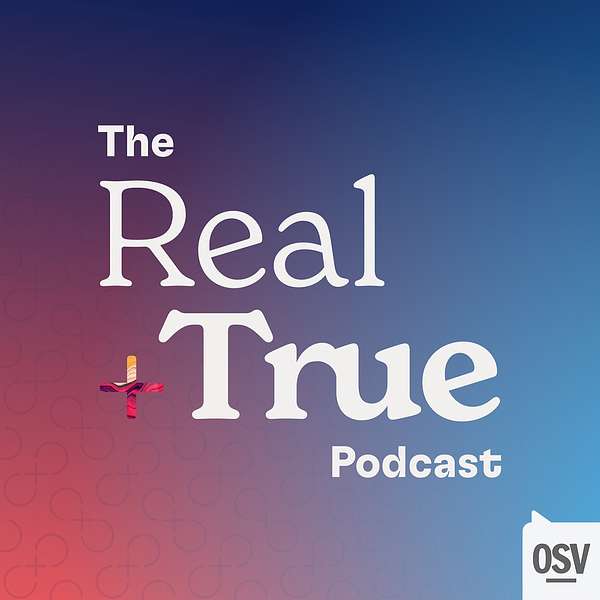
The Real + True Podcast
The Catechism is not a textbook, a collection of ideas, or a set of rules. It is the faithful echo of a God who wishes to reveal himself to us and desires us to respond. Our mission is to pass down and pass along the gift of our faith by creating beautiful, captivating, and relevant content inspired by the Catechism of the Catholic Church. And we are making this content in multiple languages and accessible for free to people all over the world. The Real+True Podcast is part of Real+True, a global initiative of Our Sunday Visitor (OSV) under the patronage of the Holy See. Visit realtrue.org for more information, including videos and other materials to learn more about the Catechism on your own or with your parish.
The Real + True Podcast
S2 E15 A Framework for Evangelization and Catechesis Using the Theological Virtues and Dr. Scott Sollom
Use Left/Right to seek, Home/End to jump to start or end. Hold shift to jump forward or backward.
In this podcast, we’re joined by Dr. Scott Sollom to discuss better catechesis through the lens of the theological virtues. We focus on Dr. Sollom’s publication in the book “Speaking the Truth in Love”, in which he wrote a chapter titled: The Theological Virtues in Catechesis: Faith, Hope and Charity in the Pedagogy of the Catechism and the Life of the Catechumen. Dr. Scott Sollom is a professor of theology and the Director of the Catechetics Office and Director of the Catechetical Institute at Fransican University. Dr. Scott Sollom has worked in the field of evangelization and catechesis for 25 years, including parishes, dioceses, and schools.
(00:00) Edmund introduces Dr. Scott Sollom and the topic of the theological virtues and their relation to catechesis. Dr. Sollom emphasizes the importance of the theological virtues (faith, hope, and charity) in guiding the goal of catechesis. The conversation explores practical ways to connect theological virtues with various aspects of teaching, especially the when explaining the “Life in Christ” we’re called to. Additionally, Dr. Sollom uses specific doctrines as examples, such as Mary's assumption, in addressing fundamental human questions. The theological virtues are a way for catechesis to answer deep questions of the human heart, fostering growth in faith, hope, and charity.
(16:34) The discussion revolves around the significance of the catechumenate and what we all can learn from OCIA (Order of Catechumens in the Initiation of Adults). The analogy of building a fire and the stages of a relationship, such as courtship leading to marriage, is used to illustrate the process of catechesis – slow and in stages. The catechumenate is described as a period of systematic and comprehensive catechesis, connecting teachings explicitly to the theological virtues of faith, hope, and charity. We also discuss the importance of disposition in receiving sacraments and the connection between living the Christian way of life and readiness to receive grace. The ancient catechumenate sought signs of growth in the virtues of faith, hope, and charity as a foundation for God's grace to take root.
(24:11) The conversation explores an analogy of dating to discuss faith, hope, and charity applied to human faculties. It emphasizes the transformative role of these virtues—faith in the intellect, hope in the imagination, and charity in the will. Specific catechism paragraphs 1812 and 1813 are referenced, highlighting the roots of human virtues in theological virtues. The goal of conversion in Christ is defined as believing, hoping, and loving supernaturally. The conversation suggests an engaging approach to catechesis that begins with recognizing natural faculties and appreciating their supernatural elevation through theological virtues, presenting them as becoming "superpowers" through grace.
(32:04) The conversation highlights the transformative approach of teaching faith, hope, and charity by connecting them to personal experiences. Augustine's emphasis on theological virtues as central to worship and life in Christ is discussed. The method, benefits, and disadvantages of bridging doctrine and experience, using theological virtues as a guide, is also discussed. Dr. Sollom mentions resources like the Franciscan Catechetical Institute and Franciscan at Home.
This episode is sponsored by the U.S. bishops' 9 Days for Life Novena
Join the U.S. bishops’ pro-life novena from January 16 through January 24
www.9daysforlife.com
An OSV Podcasts partner. Discover more ways to live, learn, and love your Catholic faith at osvpodcasts.com. Sharing stories, starting conversations.